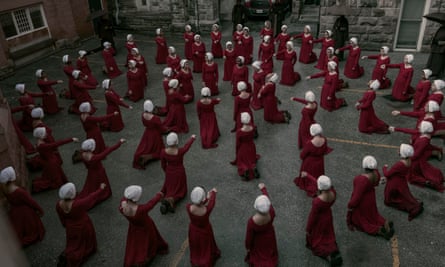Climate change will bring a dystopian future reminiscent of one of her “speculative fictions”, with women bearing the brunt of brutal repression, hunger and war, the Booker prize-winning author Margaret Atwood is to warn.
“This isn’t climate change – it’s everything change,” she will tell an audience at the British Library this week. “Women will be directly and adversely affected by climate change.”
The author, whose landmark novel The Handmaid’s Tale has been turned into an acclaimed TV series depicting a dystopian future in which women are deprived of all rights and turned into breeding machines for men, predicts conflict, hardship and an increasing struggle for survival for women as climate change takes hold.
“More extreme weather events such as droughts and floods, rising sea levels that will destroy arable land, and disruption of marine life will all result in less food,” she explained before the event. “Less food will mean that women and children get less, as the remaining food supplies will be unevenly distributed, even more than they are.”
The results she predicts bear a strong similarity to some of the futures she imagines in her fiction, including the post-apocalyptic novel Oryx and Crake, in which the treatment of women in conflict-ridden societies is a strong theme. She went on: “[Climate change] will also mean social unrest, which can lead to wars and civil wars and then brutal repressions and totalitarianisms. Women do badly in wars – worse than in peacetime.”

Under Her Eye – the title is taken from The Handmaid’s Tale – will bring together prominent figures from the arts, politics and science in a two-day festival devoted to exploring women’s futures under climate change and environmental damage, and proposals for avoiding the worst effects of global warming, some of which are already “locked in” because of our failure to cut greenhouse gas emissions as rapidly as scientists have advised.
Alice Sharp, director of the arts and science organisation Invisible Dust, which is curating the festival, told the Guardian she hoped the event would be the first of many. “We think this is the first time that the arts, sciences and politics of climate change have been brought together under one roof with a focus on women,” she said. “Women’s voices are too rarely heard in discussions of climate change.”
One of the leading women speaking at the conference is Christiana Figueres, the former UN climate chief, who oversaw the signing of the Paris climate agreement in 2015. She said: “Climate change remains one of the greatest threats to achieving sustainable development and its effects fall hardest on women.”
But she sounded a note of hope, acknowledging the activism of women on environmental issues. “Countering this reality is the gritty determination, boundless energy and unwavering spirit of women across the world, whose knowledge, skills and leadership are being harnessed in delivering solutions. Climate change is one area in which women have decisively contributed to the progress we are making.”
The two-day event will take place on Friday and Saturday at the British Library, as part of the 2018 centenary of women’s suffrage, and will feature screenings, performances, talks and debates. Among the 40 speakers will be Prof Joanna Haigh, co-director of the Grantham Institute, one of the world’s leading centres on climate policy and science; former Nasa science editor Laura Tenenbaum; Kate Raworth, self-styled “renegade economist” and author of Doughnut Economics; and New Zealand artist Ahilapalapa Rands.
Women’s lives, particularly in developing countries, are likely to be more affected by climate change than those of men, because they are so reliant on agriculture, and bear the burden of work such as fetching scarce water and firewood, and have fewer options than men, who tend to be more mobile. Women and children are also worst affected by indoor air pollution, caused by smoky cooking fires.
Yet the annual meetings on climate change held by the UN have few forums for discussing the particular problems faced by women, and women make up only a minority of the delegates.
Caroline Lucas, co-leader of the UK’s Green party, who will also take part, said: “We know that women in the arts give a unique perspective when it comes to climate change, and that they will have an important role to play in the future. There is a rich history of women guarding our environment, which is why they should be front and central to efforts aiming to counteract climate change.”
